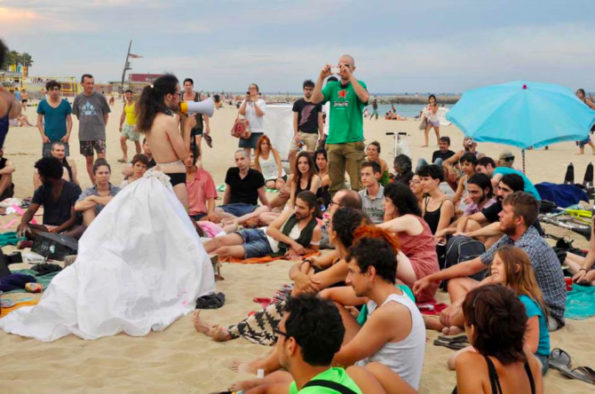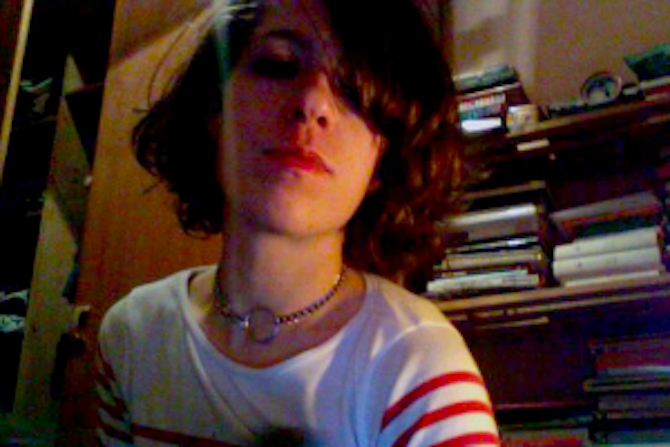Search
To search for an exact match, type the word or phrase you want in quotation marks.
A*DESK has been offering since 2002 contents about criticism and contemporary art. A*DESK has become consolidated thanks to all those who have believed in the project, all those who have followed us, debating, participating and collaborating. Many people have collaborated with A*DESK, and continue to do so. Their efforts, knowledge and belief in the project are what make it grow internationally. At A*DESK we have also generated work for over one hundred professionals in culture, from small collaborations with reviews and classes, to more prolonged and intense collaborations.
At A*DESK we believe in the need for free and universal access to culture and knowledge. We want to carry on being independent, remaining open to more ideas and opinions. If you believe in A*DESK, we need your backing to be able to continue. You can now participate in the project by supporting it. You can choose how much you want to contribute to the project.
You can decide how much you want to bring to the project.

You can imagine what a beach is like in Barcelona on a Sunday: tourists, crowds, beaches alongside marinas, a landscape surrounded by concrete, the heat, dirty sand and beach bars, playing tacky music. But the last Sunday in July, installed in La Nova Icaria beach of Barcelona, one also had to add the Festival Licra. More, self-run, spontaneous, and decentralised, artistic proposals that are extending like the plague across Barcelona.
Licra proposed a gathering on the beach, where things would happen, although in reality it was as if it was nothing new, and this is also good. I’m referring to the fact that there weren’t actually any signs indicating that art actions, recitals or concerts were taking place, beyond the fact that they were happening. Art happens, just like other things happen: beach paddle ball games, a touch of sunstroke, refreshments at exorbitant prices, families dozing and children running around. At first glance it was perhaps hard to distinguish if those who were gathered there had something to do with the art, or if it was just a group of people in beach party mode. A parasol, loudspeakers, posters, some pink balloons and people sitting in a circle, watching the improvised sandy stage where the presentations were taking place.
The majority of the artists participating had gone for recreating summer activities: home from home at the beach with music edited for the occasion; fleeing from a boat full of recycled material; generating information for surveys with the “metropolitan beach service”; or snorkelling amidst a sea of rubbish. As well as: reciting summer hits as if they were poems; reviewing the eroticism of summer adverts; sending postcards to strangers at the beach; bottling up information; talking about the country’s situation with “poetic refreshment”, and at the end of the day an unplugged Vaginoplastia concert. It’s worth saying that the latter, given the peculiarities of this action (a concert, deploying image production and the enthusiasm of the band members), drew the special attention of beach-goers: photographs, confused gazes and giggles on seeing the group become embroiled in a punk concert, with a cappella screams. What is called setting up a festival.
Barcelona holiday city, Barcelona ’mou-te’ (get-moving) and ’Ravalejar’ (ramble in the Raval) in the summer as well. The heat, the terraces, the Modernisme routes at 37 degrees, hoards of tourists or the endlessly long promenades that are impassable under the midday sun, like the Forum park. The city in the summer and its man-made, imitation beach, with the Hotel Vela like a threatening knife on the horizon, with its grimy, prefabricated sand, that leaves you all grubby as if you’d been rolling around in the dirt. This city, so pauperised, exploited, gentrified and sold out, that it only knows how to sell things. And how we sweat, working to be able to buy the things that it sells us with our labour, with a public space that is increasingly less our own, governed by more controls and regulations, with fines that are disguised as public-spirited, imposed with witty cynicism from air conditioned salons with leather seats. And their institutions, with their tinned, regurgitated, tamed and disarmed art. Amidst such a wasteland, that artistic proposals spring up from the margins and in spaces of public domain always brightens up the day. Though the only weapon for this art is a water pistol. At least, it’s a gesture that refreshes us.

Irina Mutt she keeps on quoting Annie Sprinkle.
"A desk is a dangerous place from which to watch the world" (John Le Carré)